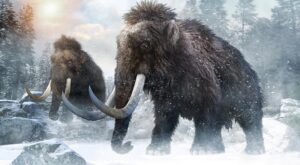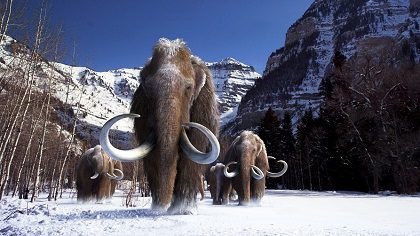Asian elephant mammoth: Asian elephant-mammoth hybrid Colossal, a US biotech startup, is using genetic engineering to resurrect the woolly mammoth. Colossal, a “de-extinction company,” wants to breed an Asian elephant-mammoth hybrid and release it in the Arctic tundra. This ambitious project, backed by funding and scientific curiosity, has stirred up research community excitement and skepticism.
Colossal’s vision goes beyond the woolly mammoth’s resurrection. The 1930s-extinct thylacine, also known as the “Tasmanian wolf” or “Tasmanian tiger,” may return. Colossal also wants to bring the dodo back from the Indian Ocean islands, where humans exterminated it in the 18th century.
Colossal has partnered with Elephant Havens, a wildlife foundation in Botswana’s Okavango Delta, to help orphaned elephants through cutting-edge AI research. Elephants are orphaned mostly due to human-wildlife conflicts, often caused by fires. Elephant Havens co-founder Debra Stevens emphasizes the urgency of nurturing these orphans and skillfully reintroducing them to the wild through an elaborate decade-long program.
Elephant Havens and Colossal are using AI to meticulously analyze the behavior of these majestic creatures to achieve this remarkable feat. The integration of genomic data, specific to each elephant, with insights from experienced elephant handlers is a groundbreaking approach to prepare orphans for a successful return to their natural habitat.


READ MORE: Mammals vs. Dinosaurs: Ancient Clash Unveiled
Elephant communities have complex social hierarchies, making reintroduction difficult. An orphan in a wild herd can suffer from grief and disorientation. Reintroduced groups often seek captivity. Thus, Elephant Havens uses a long-term reintroduction strategy to “soft release” orphans into a 1,000-acre enclosure, allowing them to gradually adapt to independent survival.
Colossal will use Elephant Havens’ knowledge, AI modeling, and genetic data to understand elephant behavior. They are building an AI system that can understand elephant social behaviors and leadership models by analyzing handler-interpreted video footage.
Equally important, Colossal is sequencing Elephant Havens’ orphans’ genomes and conducting gene-trait analyses to understand how genetic information affects behavior. These findings will help the mammoth-elephant hybrid project improve cold-temperature resilience through genetic traits like hair and fat deposits.
This groundbreaking research impacts animal conservation beyond the mammoth project. Colossal shares its technological advances and breakthroughs with conservation partners to accelerate elephant and wildlife conservation.
The collaboration between Elephant Havens and Colossal shows how AI can boost conservation efforts and protect orphaned elephants. This remarkable partnership brings the woolly mammoth’s return to the Arctic tundra closer.

